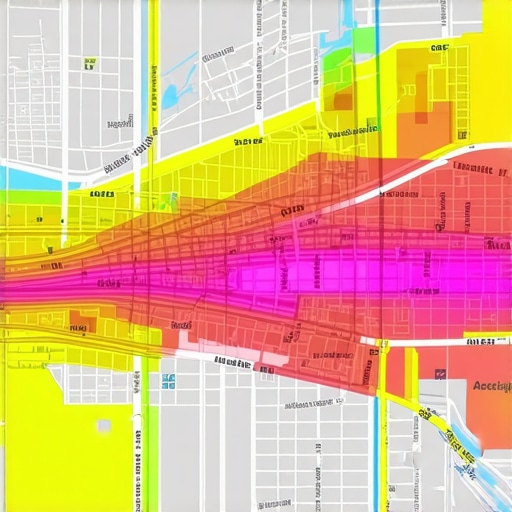Unlocking the Power of GeoGrid Tracking for Local SEO Mastery in 2024
As the digital landscape evolves, local businesses must leverage sophisticated techniques to dominate Google Maps rankings. GeoGrid tracking emerges as a pivotal tool, offering granular insights into geographical performance metrics. This article explores how integrating geo-spatial analytics with cutting-edge SEO strategies can propel your visibility to new heights in 2024.
Why GeoGrid Mapping Represents the Future of Local Search Optimization
Traditional local SEO tactics often overlook the nuanced dynamics of geo-specific user behavior. GeoGrid mapping allows marketers to visualize and analyze user interactions within precise grid segments, revealing hidden opportunities for ranking enhancement. By understanding these micro-movements, businesses can tailor their local SEO efforts with unmatched precision.
Strategic Implementation of GeoGrid Tracking for Maps Rank Enhancement
Implementing geo-tracking involves deploying advanced tools such as cutting-edge GeoGrid tracking tools. These systems generate detailed heatmaps, enabling marketers to identify high-traffic zones and adjust their Google My Business (GMB) optimization strategies accordingly. Consistent data collection over time ensures adaptive tactics that respond to shifting user patterns.
What Are the Critical Challenges in Applying GeoGrid Data to Local SEO?
How can businesses accurately interpret geo-spatial data without falling prey to false positives?
Interpreting geo-spatial data requires a nuanced understanding of user intent and movement patterns. Over-reliance on raw data without contextual analysis can lead to misinformed decisions. It’s vital to combine geo-grid insights with qualitative data, such as customer feedback and competitive analysis, to refine your local SEO approach.
Harnessing Advanced GMB Software to Amplify GeoGrid Effectiveness
Modern GMB software solutions, like those discussed in GMB software innovations, provide automated tracking and reporting features that streamline geo-spatial analysis. These tools allow real-time monitoring and rapid adjustment of local SEO tactics, ensuring your business stays ahead in the Maps rankings.
Expert Insights: How GeoGrid Data Can Revolutionize Your Local SEO Strategy
Experienced digital marketers emphasize that integrating geo-spatial analytics with comprehensive local SEO tactics results in a synergistic effect, dramatically improving Maps rankings. This approach entails continuous data collection, competitive benchmarking, and iterative strategy adjustments, underpinned by a deep understanding of user movement patterns and search intent.
Are there any open debates regarding the limitations of geo-spatial tracking in dynamic urban environments?
Yes, some experts argue that geo-spatial data can be less reliable in densely populated urban areas due to signal interference and rapid movement changes. To mitigate this, combining multiple data sources and employing predictive analytics enhances accuracy. For further insights, consult authoritative research such as the white paper on urban geo-spatial analytics.
For those seeking to refine their local SEO with expert-level precision, exploring advanced GeoGrid tracking techniques is recommended. Your journey toward local search dominance begins with mastering these innovative tools and strategies—start today to outperform competitors in 2024.
Unlocking Advanced GeoSpatial Strategies for Local SEO Success
As the digital terrain becomes increasingly complex, the role of sophisticated geo-spatial analytics in local SEO cannot be overstated. Business owners and marketers who harness the power of detailed geoGrid mapping can uncover hidden growth opportunities, optimize their Google My Business (GMB) profiles more effectively, and secure higher rankings in local search results. Integrating these insights with innovative tools is essential for staying ahead in 2024.
How Can Nuanced GeoGrid Data Drive Smarter Local SEO Decisions?
Understanding the micro-movements of potential customers within targeted geographical zones allows for hyper-local optimization. By analyzing heatmaps generated through advanced GeoGrid tracking tools, marketers can identify underserved micro-neighborhoods, optimize local citations, and tailor content to specific community needs. This granular approach moves beyond broad city-wide tactics, enabling tailored strategies that resonate more directly with local audiences.
Can Real-Time Geo-Spatial Data Be Fully Trusted in Dynamic Urban Environments?
Urban landscapes are inherently fluid, with signals affected by high-rise buildings, traffic interference, and rapid population movement. Experts highlight that, while geo-spatial tracking has matured significantly, its reliability can fluctuate in these environments (see urban geo-spatial analytics research for detailed insights). To counteract these challenges, combining multiple data sources, including Wi-Fi signals, mobile device sensors, and predictive modeling, enhances accuracy. Continuous validation and calibration of data ensure your local SEO strategies stay responsive and effective.
What Are the Next-Generation Tools to Elevate Your Maps Ranking in 2024?
Emerging GMB software solutions, as discussed in GMB software innovations, incorporate AI-driven analytics, automated reporting, and predictive insights. These capabilities allow marketers to monitor geoGrid performance in real time, identify emerging hotspots, and swiftly adapt their tactics. Leveraging such tools ensures your local SEO efforts are both proactive and resilient, giving you a competitive edge in crowded markets.
Are there ethical considerations or privacy concerns when deploying advanced geo-tracking systems?
Yes, privacy considerations are paramount. While geo-tracking offers valuable insights, it must comply with data protection regulations such as GDPR and CCPA. Transparent communication with customers about data collection practices and securing explicit consent are best practices. For detailed guidance on ethical geo-spatial data use, consult authoritative resources like the privacy policy page. Understanding these boundaries helps build trust and ensures sustainable local SEO growth.
If you’re eager to deepen your expertise, explore mastering GeoGrid tracking techniques and learn how to turn data into actionable strategies that outperform competitors. The path to local search dominance is paved with meticulous analysis and strategic agility—start now to see measurable results in 2024.
Leveraging Predictive Analytics to Anticipate Geo-Behavior Shifts in Urban Environments
As urban landscapes evolve, static geo-spatial data becomes insufficient for maintaining a competitive edge. Forward-looking predictive analytics can model potential movement patterns, traffic flows, and consumer behaviors based on historical data combined with real-time signals. According to a comprehensive study by the Journal of Urban Analytics, integrating machine learning algorithms with geoGrid data can forecast micro-movement trends with remarkable accuracy, enabling proactive SEO adjustments.
Integrating Multi-Source Data Streams for Robust Geo-Targeting Accuracy
Relying solely on mobile GPS signals can lead to gaps or inaccuracies, especially in dense urban zones. To mitigate this, marketers should combine diverse data sources such as Wi-Fi triangulation, Bluetooth beacons, and even transaction data from local stores. This multi-layered approach not only enhances spatial accuracy but also provides richer context about consumer intent. For example, combining foot traffic with purchase data can reveal underserved niches within micro-neighborhoods, opening avenues for hyper-local content and offers.
How Can Advanced GeoGrid Tools Enhance Customer Journey Mapping?
Deep insights into customer pathways through geo-spatial analysis unlock unprecedented personalization opportunities. Using sophisticated tools like GeoGrid tracking platforms that incorporate AI-driven heatmaps, businesses can visualize actual customer journeys from initial discovery to conversion points. This granularity allows for tailored content delivery at critical touchpoints, boosting engagement and conversion rates. Additionally, integrating these insights with CRM systems facilitates a seamless, personalized user experience across multiple channels.
What Ethical and Privacy Considerations Must Be Addressed in Geo-Tracking Deployments?
While advanced geo-tracking offers powerful insights, it raises significant privacy concerns. Compliance with regulations such as GDPR and CCPA is not optional but essential. Transparent data collection policies, explicit user consent, and anonymization techniques are fundamental practices. The privacy policy guidelines emphasize that ethical data use builds consumer trust, which is crucial for long-term success. Striking a balance between data utility and user privacy is the hallmark of responsible geo-spatial analytics.
Exploring the Future of Geo-Targeting: AI and Machine Learning in Local SEO
Emerging AI-driven tools are set to revolutionize geo-targeting strategies by enabling real-time, adaptive campaign adjustments. These solutions analyze vast datasets to identify micro-trends, predict shifts in user behavior, and automatically optimize local SEO tactics. For instance, predictive models can suggest where to focus GMB optimization efforts next week based on anticipated foot traffic increases. Staying ahead requires continuous learning and adaptation to these technological frontiers, which promise to make local SEO more dynamic and effective than ever before.
Unlocking Next-Level GeoSpatial Intelligence for Local Search Supremacy
In the rapidly evolving landscape of local SEO, harnessing refined geo-spatial analytics is no longer optional but essential. Advanced GeoGrid mapping leverages machine learning algorithms and high-resolution spatial data to identify micro-movement patterns and consumer hotspots that traditional methods overlook. This nuanced approach empowers marketers to craft hyper-targeted campaigns, optimizing GMB listings and local citations with surgical precision.
Can Multi-Layered Data Integration Elevate Your Geo-Targeting Accuracy?
Absolutely. Incorporating diverse data streams—such as Wi-Fi triangulation, Bluetooth beacon signals, transaction records, and social media geotags—creates a multi-dimensional view of customer behavior. This comprehensive data fusion mitigates the limitations of GPS signals in dense urban zones, resulting in highly reliable spatial insights. As detailed in the Journal of Urban Analytics, such integrative approaches significantly enhance the predictive power of geo-spatial models.
What Are the Cutting-Edge Tools to Visualize and Exploit Customer Journey Data?
Innovative platforms utilizing AI-powered heatmaps and trajectory mapping enable marketers to visualize real-world customer pathways from initial discovery through conversion. These insights facilitate personalized content delivery and localized offers at pivotal touchpoints. Integrating geo-spatial data with CRM systems fosters a seamless, contextually relevant user experience, fostering loyalty and boosting local rankings.
How Do Ethical Considerations Shape the Future of Geo-Tracking in Local SEO?
Ethical deployment of geo-tracking systems is paramount. Compliance with GDPR, CCPA, and other privacy frameworks is non-negotiable. Transparency in data collection, obtaining explicit user consent, and implementing anonymization techniques build trust while safeguarding consumer rights. Resources such as the privacy policy guidelines offer comprehensive frameworks for responsible geo-spatial analytics, ensuring sustainable, trust-based growth strategies.
What Role Will AI and Machine Learning Play in the Next Generation of Local SEO?
Emerging AI-driven solutions are set to revolutionize geo-targeting by enabling real-time, autonomous campaign adjustments. These tools analyze vast and complex datasets to identify micro-trends, forecast user movement, and optimize local SEO tactics dynamically. Staying ahead requires continuous learning and adaptation to these technological advancements, which will make local search optimization more agile, precise, and impactful in 2024 and beyond.
Expert Insights & Advanced Considerations
Micro-Movement Analytics Are Game-Changing
Leveraging high-resolution geo-spatial data enables marketers to identify micro-movement patterns that reveal untapped local opportunities, making hyper-local SEO strategies more precise and impactful.
Predictive Analytics Will Redefine Geo-Targeting
Applying machine learning models to geoGrid data allows for forecasting user movement shifts, enabling proactive adjustments to local SEO tactics before changes occur, thereby maintaining a competitive edge.
Multi-Source Data Fusion Is Essential
Combining GPS, Wi-Fi, Bluetooth, and transaction data creates a robust, multi-layered understanding of customer behavior, especially in dense urban environments where signal interference can distort single-source data.
Ethical Geo-Tracking Is the Foundation of Trust
Implementing transparent data collection practices and securing explicit user consent are non-negotiable to build long-term trust and ensure compliance with privacy regulations like GDPR and CCPA.
AI-Driven Automation Will Lead the Next Wave of Optimization
Emerging AI tools facilitate real-time, autonomous adjustments to local SEO campaigns by analyzing vast datasets for micro-trends, making local search strategies more agile and effective than ever.
Curated Expert Resources
- Google’s Official Privacy & Data Collection Guidelines: Essential for understanding compliance and ethical standards for geo-tracking.
- Journal of Urban Analytics: Provides in-depth research on urban geo-spatial analytics, critical for advanced practitioners.
- GMB Software Innovations (https://geogridranker.com/gmb-software-secrets-innovative-tools-to-elevate-local-seo): Offers insights into cutting-edge tools for real-time geo-spatial data analysis and local SEO optimization.
- Mastering GeoGrid Tracking (https://geogridranker.com/mastering-geogrid-tracking-boost-your-maps-rank-effectiveness): A comprehensive guide for experts looking to deepen their understanding of geo-spatial analytics.
Final Expert Perspective
Mastering advanced geo-spatial analytics, particularly geoGrid tracking, is no longer optional but essential for local SEO dominance in 2024. These tools and insights empower professionals to craft hyper-targeted, proactive strategies that adapt to dynamic urban landscapes, ensuring sustained visibility and competitive advantage. Dive deep into these resources and refine your technical expertise—your next breakthrough in local search mastery awaits. Engage with industry peers, share your insights, and contribute to evolving best practices in geo-spatial SEO.


![5 Ways to Shrink Your Local Proximity Gap in 2026 [Audit]](https://geogridranker.com/wp-content/uploads/2026/02/5-Ways-to-Shrink-Your-Local-Proximity-Gap-in-2026-Audit.jpeg)